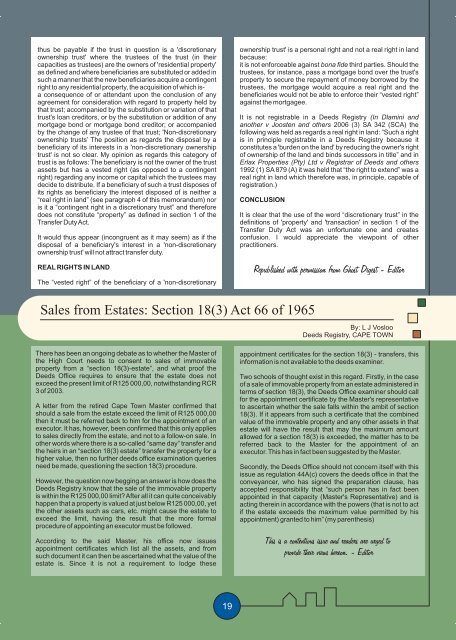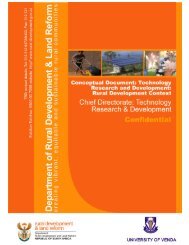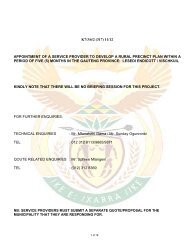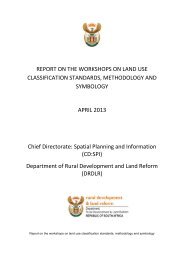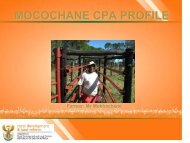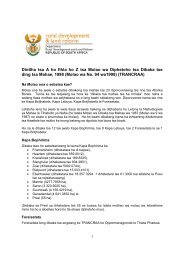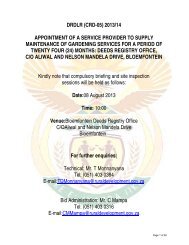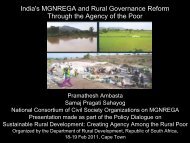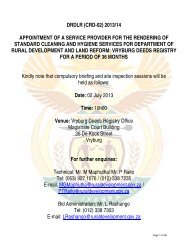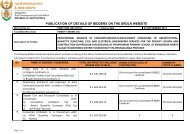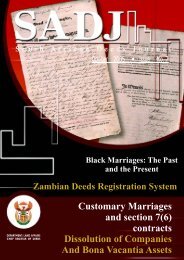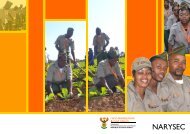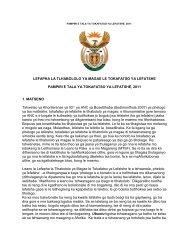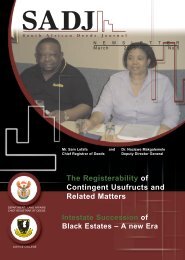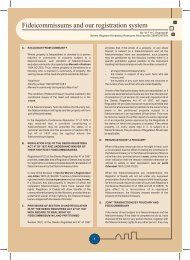South African Deeds Journal
South African Deeds Journal - Department of Rural Development ...
South African Deeds Journal - Department of Rural Development ...
- No tags were found...
You also want an ePaper? Increase the reach of your titles
YUMPU automatically turns print PDFs into web optimized ePapers that Google loves.
thus be payable if the trust in question is a 'discretionary<br />
ownership trust' where the trustees of the trust (in their<br />
capacities as trustees) are the owners of 'residential property'<br />
as defined and where beneficiaries are substituted or added in<br />
such a manner that the new beneficiaries acquire a contingent<br />
right to any residential property, the acquisition of which isa<br />
consequence of or attendant upon the conclusion of any<br />
agreement for consideration with regard to property held by<br />
that trust; accompanied by the substitution or variation of that<br />
trust's loan creditors, or by the substitution or addition of any<br />
mortgage bond or mortgage bond creditor; or accompanied<br />
by the change of any trustee of that trust; 'Non-discretionary<br />
ownership trusts’ The position as regards the disposal by a<br />
beneficiary of its interests in a 'non-discretionary ownership<br />
trust' is not so clear. My opinion as regards this category of<br />
trust is as follows: The beneficiary is not the owner of the trust<br />
assets but has a vested right (as opposed to a contingent<br />
right) regarding any income or capital which the trustees may<br />
decide to distribute. If a beneficiary of such a trust disposes of<br />
its rights as beneficiary the interest disposed of is neither a<br />
“real right in land” (see paragraph 4 of this memorandum) nor<br />
is it a “contingent right in a discretionary trust” and therefore<br />
does not constitute “property” as defined in section 1 of the<br />
Transfer DutyAct.<br />
It would thus appear (incongruent as it may seem) as if the<br />
disposal of a beneficiary's interest in a 'non-discretionary<br />
ownership trust' will not attract transfer duty.<br />
REAL RIGHTS IN LAND<br />
The “vested right” of the beneficiary of a 'non-discretionary<br />
ownership trust' is a personal right and not a real right in land<br />
because:<br />
it is not enforceable against bona fide third parties. Should the<br />
trustees, for instance, pass a mortgage bond over the trust's<br />
property to secure the repayment of money borrowed by the<br />
trustees, the mortgage would acquire a real right and the<br />
beneficiaries would not be able to enforce their “vested right”<br />
against the mortgagee.<br />
It is not registrable in a <strong>Deeds</strong> Registry (In Dlamini and<br />
another v Joosten and others 2006 (3) SA 342 (SCA) the<br />
following was held as regards a real right in land: “Such a right<br />
is in principle registrable in a <strong>Deeds</strong> Registry because it<br />
constitutes a 'burden on the land' by reducing the owner's right<br />
of ownership of the land and binds successors in title” and in<br />
Erlax Properties (Pty) Ltd v Registrar of <strong>Deeds</strong> and others<br />
1992 (1) SA 879 (A) it was held that “the right to extend” was a<br />
real right in land which therefore was, in principle, capable of<br />
registration.)<br />
CONCLUSION<br />
It is clear that the use of the word “discretionary trust” in the<br />
definitions of 'property' and 'transaction' in section 1 of the<br />
Transfer Duty Act was an unfortunate one and creates<br />
confusion. I would appreciate the viewpoint of other<br />
practitioners.<br />
Republished with permission from Ghost Digest - Editor<br />
Sales from Estates: Section 18(3) Act 66 of 1965<br />
By: L J Vosloo<br />
<strong>Deeds</strong> Registry, CAPE TOWN<br />
There has been an ongoing debate as to whether the Master of<br />
the High Court needs to consent to sales of immovable<br />
property from a “section 18(3)-estate”, and what proof the<br />
<strong>Deeds</strong> Office requires to ensure that the estate does not<br />
exceed the present limit of R125 000,00, notwithstanding RCR<br />
3 of 2003.<br />
A letter from the retired Cape Town Master confirmed that<br />
should a sale from the estate exceed the limit of R125 000,00<br />
then it must be referred back to him for the appointment of an<br />
executor. It has, however, been confirmed that this only applies<br />
to sales directly from the estate, and not to a follow-on sale. In<br />
other words where there is a so-called “same day” transfer and<br />
the heirs in an “section 18(3) estate” transfer the property for a<br />
higher value, then no further deeds office examination queries<br />
need be made, questioning the section 18(3) procedure.<br />
However, the question now begging an answer is how does the<br />
<strong>Deeds</strong> Registry know that the sale of the immovable property<br />
is within the R125 000,00 limit?After all it can quite conceivably<br />
happen that a property is valued at just below R125 000,00, yet<br />
the other assets such as cars, etc. might cause the estate to<br />
exceed the limit, having the result that the more formal<br />
procedure of appointing an executor must be followed.<br />
According to the said Master, his office now issues<br />
appointment certificates which list all the assets, and from<br />
such document it can then be ascertained what the value of the<br />
estate is. Since it is not a requirement to lodge these<br />
appointment certificates for the section 18(3) - transfers, this<br />
information is not available to the deeds examiner.<br />
Two schools of thought exist in this regard. Firstly, in the case<br />
of a sale of immovable property from an estate administered in<br />
terms of section 18(3), the <strong>Deeds</strong> Office examiner should call<br />
for the appointment certificate by the Master's representative<br />
to ascertain whether the sale falls within the ambit of section<br />
18(3). If it appears from such a certificate that the combined<br />
value of the immovable property and any other assets in that<br />
estate will have the result that may the maximum amount<br />
allowed for a section 18(3) is exceeded, the matter has to be<br />
referred back to the Master for the appointment of an<br />
executor. This has in fact been suggested by the Master.<br />
Secondly, the <strong>Deeds</strong> Office should not concern itself with this<br />
issue as regulation 44A(c) covers the deeds office in that the<br />
conveyancer, who has signed the preparation clause, has<br />
accepted responsibility that “such person has in fact been<br />
appointed in that capacity (Master's Representative) and is<br />
acting therein in accordance with the powers (that is not to act<br />
if the estate exceeds the maximum value permitted by his<br />
appointment) granted to him” (my parenthesis)<br />
This is a contentious issue and readers are urged to<br />
provide their views hereon. - Editor<br />
19


